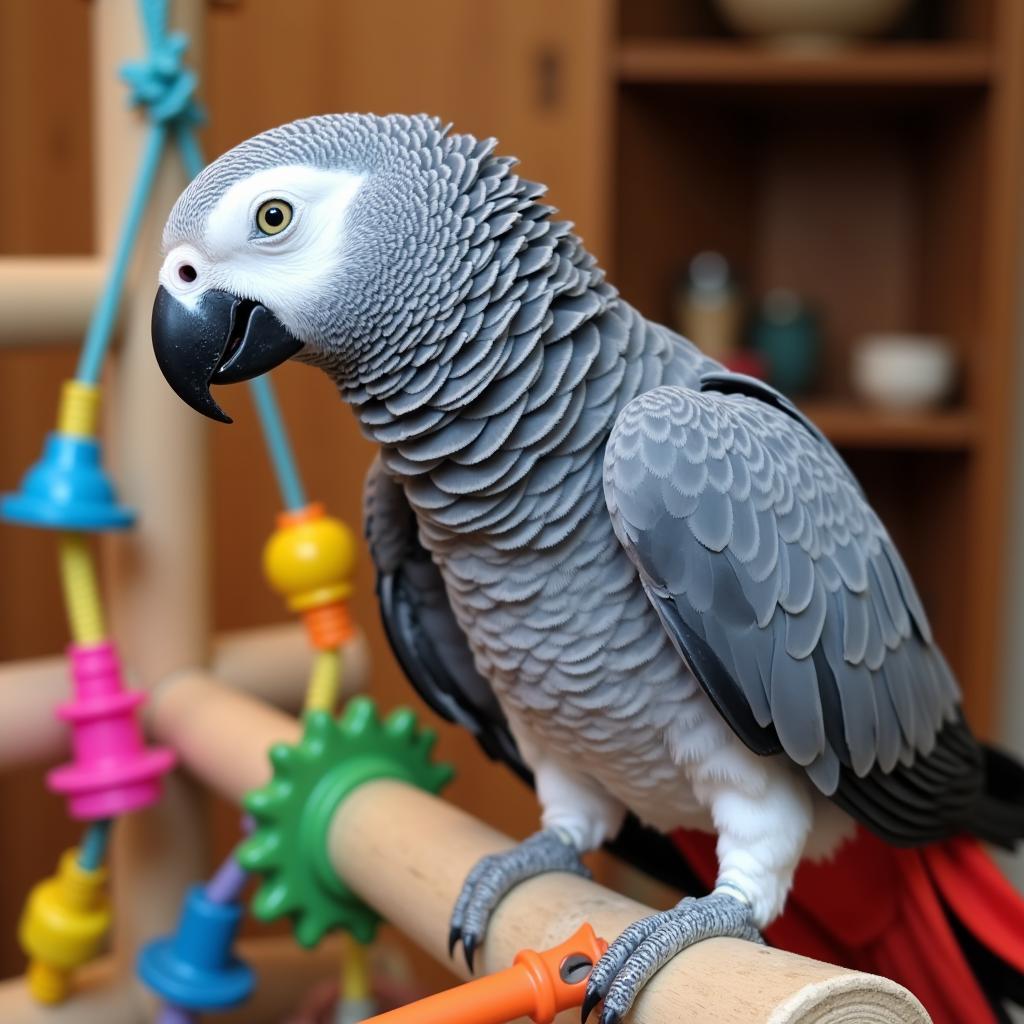Can African Greys Have Heart Attacks?
African grey parrots, revered for their intelligence and charm, are prone to a unique set of health concerns, just like any other species. While not as common as in humans, heart issues in African greys can occur, and understanding the risks and symptoms is crucial for responsible bird ownership.
 African Grey Parrot Enjoying Healthy Diet
African Grey Parrot Enjoying Healthy Diet
Understanding Heart Health in African Greys
While the term “heart attack” might bring to mind a specific event in humans, it’s important to note that cardiovascular disease in parrots can manifest in various ways. Unlike humans, African greys don’t typically experience heart attacks caused by blocked arteries (atherosclerosis). However, they can suffer from other heart conditions, including:
- Atherosclerosis: Although less frequent, this condition, characterized by plaque buildup in the arteries, can still affect African greys, especially those consuming high-fat diets.
- Cardiomyopathy: This refers to diseases of the heart muscle itself, often leading to an enlarged heart and difficulty pumping blood effectively.
- Arrhythmias: These are irregular heart rhythms, which can be too fast, too slow, or simply erratic.
Factors Contributing to Heart Problems in African Greys
Several factors can increase the risk of heart problems in your feathered companion. Understanding these can help you take proactive steps to ensure your parrot’s well-being:
- Diet: A diet high in fat, especially saturated and trans fats, can contribute to atherosclerosis. Seeds, while a natural part of their diet, should be offered in moderation.
- Obesity: Just like in humans, obesity puts added strain on the heart and increases the risk of cardiovascular issues.
- Genetics: Some African greys may be genetically predisposed to heart problems.
- Infections: Certain viral or bacterial infections can damage the heart muscle.
- Toxins: Exposure to toxic substances like cigarette smoke, pesticides, and heavy metals can harm the heart.
Recognizing the Signs of Heart Trouble in Your Parrot
Recognizing the subtle signs of heart problems in your African grey is crucial for early intervention. Keep a watchful eye out for these potential symptoms:
- Difficulty breathing: Labored breathing, especially after minimal activity, can be a sign of heart distress.
- Tail bobbing: While sometimes a normal behavior, persistent tail bobbing, especially when accompanied by breathing difficulties, can indicate a problem.
- Lethargy: A sudden decrease in activity or a reluctance to play could signal an underlying health issue, including heart problems.
- Loss of appetite: A marked decrease in food intake is always a cause for concern and should warrant a veterinary visit.
- Cyanosis: This refers to a bluish discoloration of the skin, usually around the beak or nares, indicating a lack of oxygen.
“Prevention is key when it comes to your African grey’s heart health,” says Dr. Avianna Bird, a leading avian veterinarian. “A balanced diet, regular exercise, and routine veterinary checkups are crucial.”
What to Do If You Suspect a Problem
If you notice any of these symptoms in your African grey, it’s imperative to seek immediate veterinary attention. Early diagnosis and treatment can significantly improve the outcome for your bird.
 African Grey Parrot Engaging in Play
African Grey Parrot Engaging in Play
Keeping Your African Grey’s Heart Healthy
By following these proactive steps, you can help your African grey live a long, healthy life:
- Provide a balanced diet: Offer a variety of fresh fruits, vegetables, and high-quality pellets specifically formulated for African greys. Limit seeds and high-fat treats.
- Encourage exercise: Provide ample opportunities for your parrot to fly, climb, and play.
- Schedule regular vet visits: Regular checkups allow your veterinarian to monitor your bird’s health and detect potential problems early on.
- Maintain a healthy weight: Monitor your parrot’s weight and adjust their diet and exercise regimen as needed.
- Create a stress-free environment: Minimize loud noises, sudden changes, and potential stressors in your parrot’s environment.
While heart problems in African greys can be serious, they are often preventable with proper care, a healthy lifestyle, and vigilant observation. By being informed and proactive, you can help your feathered friend enjoy a long, happy, and heart-healthy life.
Frequently Asked Questions
- How common are heart attacks in African greys? While not as common as in humans, African greys can experience heart problems, but they typically don’t suffer from heart attacks caused by blocked arteries.
- What should I feed my African grey to keep its heart healthy? A balanced diet rich in fresh fruits, vegetables, and high-quality pellets is essential. Limit seeds and fatty treats.
- Can my African grey recover from a heart problem? The outcome depends on the specific condition and the severity. Early diagnosis and treatment offer the best chance of recovery.
- How often should I take my African grey to the vet? Annual checkups are recommended for healthy birds, while more frequent visits may be necessary for birds with existing health conditions.
- What are the signs of a stroke in an African grey? Symptoms of a stroke can include loss of balance, head tilt, paralysis, and seizures. Seek immediate veterinary care if you notice these signs.
Need further assistance? Please contact us: Phone Number: +255768904061, Email: kaka.mag@gmail.com Or visit us at: Mbarali DC Mawindi, Kangaga, Tanzania. We have a 24/7 customer support team.

